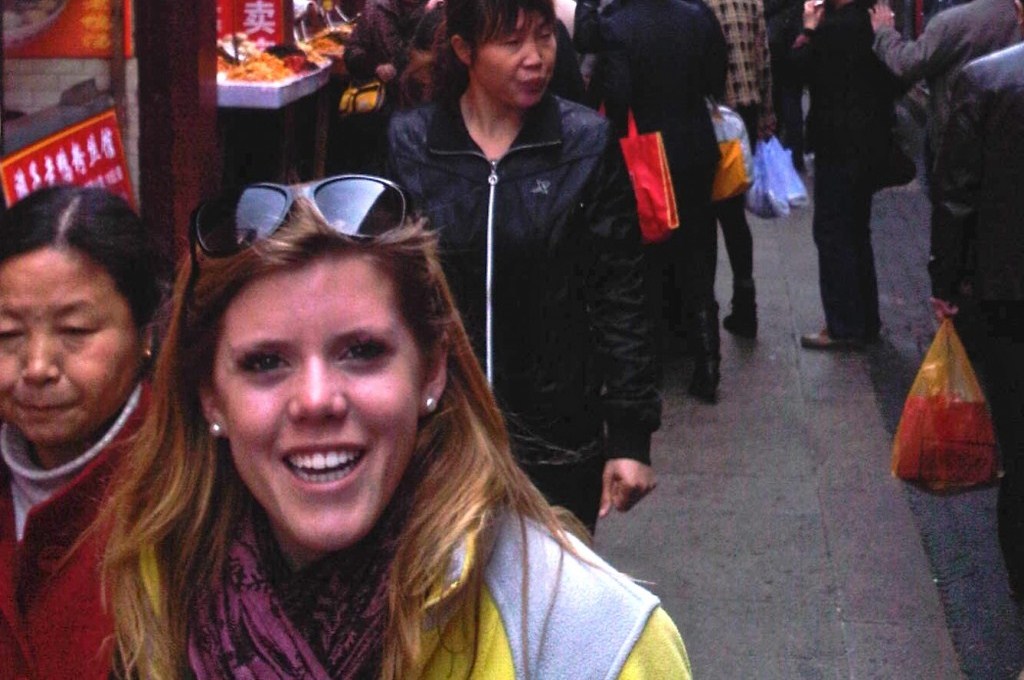Redefining Gap Year Travel: A Conversation with Author Monika Lutz

When we learned that our Foreign Correspondent alumna, Monika Lutz published her first book at age 21, we were thrilled that the rest of the world would soon learn more about Monika’s epic gap year travel! After high school high achiever Monika was rejected from every college she applied to, she decided to spend the next two years figuring out what she really wanted out of life. In her new book, Now What?, Monika traces her internships and travels through nine cities and six countries–revealing all of the high points and low points along the way. We were excited to get the inside scoop in her first interview below.
Rachel: I totally understand how tough it must have been getting rejected from all of the colleges you initially applied to–especially after having been such a high achiever. But, almost immediately after the rejections came, it seems like you decided to set out on an international gap year. What was your previous knowledge about gap years? How did the people in your life react? What were some of the biggest challenges–internal and external–you faced in going?
Monika: The decision to take a gap year seems to happen within seconds in “Now What?” to allow time to cut to the core of the journey and the struggles. In real time, the decision evolved step by step. I started with one location: India. I found something valuable to do there that would help me discover a profession I was interested in (working with social entrepreneurs in the jungle). Just before I left to the jungle, I confirmed my internship in San Francisco. By the time I touched down in SF, I didn’t know where I would go next. I let my learnings and growth that occurred while in SF inspire my next move–which turned out to be London. I am so thankful I progressed in this manner because I changed in so many ways over my year. If I had planned my entire year the day I was rejected, I probably would have spent my year working with social entrepreneurs in five different developing countries. That work is so far from designing high fashion wardrobes for Shanghai Fashion Week or serving on a confidential assignment to the US Congress, the way it actually worked out.
Before I left, I thought gap years were for Europeans who wanted to backpack across the continent before going to “Uni.” I wanted to change that. I wanted to create a year where I could develop personally, professionally, and spiritually while exploring the world and learning from each country’s natives. After all, some of the best lessons in life cannot be taught through a textbook.
At the time, it seemed as though everyone in my community thought my taking a gap year was a euphemism for saying I was burned out or had reached my peak. As I began writing them more and more about the professional and personal growth I was experiencing though, they recognized how the year was helping me grow in ways college could not have. Today, some of those same people are my biggest supporters and most encouraging mentors.
Rachel: How long did it take you to plan each stop in your gap year, and how much did you plan in advance of setting out?
Monika: Every location was different. DC the second time around was simple because I selected the same residents club, knew the city, and had friends there already. In that case, it took three phone calls. Singapore, by contrast, was by far the hardest because I went through multiple visa rejections, housing struggles, and did not have any community on the island when I arrived. In general, I knew about my next internship four months in advance so I would immediately book my flights and housing that far out, then spend the rest of the weeks leading up to my arrival watching documentaries or finding friends of friends who had been there before me.
Rachel: In the age of unpaid internships, you seemed to do the impossible and get not just one, but several paid internships before even being accepted to college! Both the college students and graduates want to know: what is your secret?
Monika: I tried really hard to decode my strategy in the book, especially as they correspond to every offer, so for the more intricate strategies, readers should look there. One thing high schoolers should never forget though: play to your strengths!
Rachel: Though you experienced travel ups and downs over the course of your two gap years–a certain airport detainment being one of them–you mostly come across as a pretty adept traveler! What was your previous travel experience? Had you solo traveled internationally before?
Monika: I was an exchange student in Versailles, France when I was 16 and I am a dual citizen of the US and Germany so I had spent a fair amount of time abroad and traveling before my gap year. That said, traveling alone can be an entirely new challenge and I still made new mistakes and learned new lessons in every location. In Now What?, you can see from chapter to chapter how my preparations and “emergency procedures” get more sophisticated as I go along.
Rachel: You clearly gained many different things both personally and professionally in each country, but the people want to know: which travel destination was your favorite?
Monika: After my two years, I have to distinguish between different shades of “favorite.” By that I mean, China was my favorite country to explore because it is so culturally and topographically diverse. Singapore has the best variety of delicious cuisine. England has the best tourism activities. DC has the best free events.
Rachel: Part of the reason for taking a gap year was for you to slow down and see what was out there instead of just pursuing a dream (the Ivy League) or career path that ultimately may not be the be-all-end-all. (I thought your dad gave you great advice in encouraging you to take part in that yoga retreat!) Yet, even after you collapsed in DC, it seems like you were still living an incredibly busy life–the 5:30am wake ups, flashcards, internships, running, socializing, and flying to different countries every weekend all come to mind. Do you think you actually changed after your experience in DC, and if so, how? And, how have you maintained that change in your current life?
Monika: The DC chapter was a tempting story to omit. After all, I relapsed to the “high school version” of myself. I insisted on keeping the chapter in because it highlights a key learning from my year: what surrounds you does not define you. To take it one step further, happiness is not found in circumstance, it is found in self. Taking me out of high school doesn’t mean my high school habits were gone. If I was going to learn work-life balance–or any habit, for that matter–I had to start with myself. In my current life, this lesson is particularly important. There are enough speakers at the 13 Harvard schools every day that I could eat every meal by just attending events. Add work load and club commitments, it is easy to succumb to burn out. In this area, I think the greatest blessing of my gap year was showing me that the whole house of cards can tumble down and I can still create a fulfilling life for myself. For my classmates who came straight in, it may be harder for them to understand that there is still an amazing world that awaits them if a grade comes back lower than desired. Most importantly, my gap year enabled me to arrive at college aware of what I wanted to study. I didn’t have to jump majors, and I didn’t slip into any bad scenes because I knew who I was and what I stood for.
Rachel: You had some pretty scary things happen to you during your travels–first being stalked in New York and then having a roommate spike your drink in China. How did you stay strong? How did you get back on the horse and keep traveling?
Monika: You can’t control the actions of others. You can only control how you respond. There are plenty of people in NYC who have bad intentions for young women. Will I let that stop me from pursuing my dreams? Never. I tried to remind myself that all I should take from every experience is learnings, not fear. I am 100x more street smart now than I was back in NYC because of that experience, so I see it as an advantage because it taught me a new way to think.
Rachel: If possible, is there anything you’d do differently in your two gap years?
Monika: I’ve been thinking for 20 minutes and can’t think of an immediate answer to that…I am tempted to say that if I could go back, I would have figured out the visa situation before (nearly!) getting deported in London, I would not have had that conversation that led to my being stalked in NYC…but those mistakes made me the better, stronger version of myself that I am today. If I traded in the troubles, I would have to give back the wisdom as well. A trade I am not ready to make.
Rachel: After your whirlwind two years, what’s it like being a regular college student? Did you experience any reverse culture shock and if so, how did you deal with it?
Monika: Going back to college after working and traveling feels a little bit like going back to the gym after four seasons as a professional athlete. On one hand, it can be frustrating to do work for (what can feel like) the sake of doing work. By contrast, that “practice” environment provides a great opportunity to take risks and invest in bettering your skill set instead of always producing. Certaintly, my gap year gave me a greater perspective on what matters in life and I value my education a lot more because I experienced how hard it is to get by in the real world without a degree.
Rachel: I’m assuming you’ve already got your eye on your next travel adventure. So, where’re you taking us to? (We can’t wait to read all about it!)
Monika: You know me too well! I am spending January in Greece with my family–Santorini and Crete, in particular. I am so excited to experience the food and learn from the locals!








